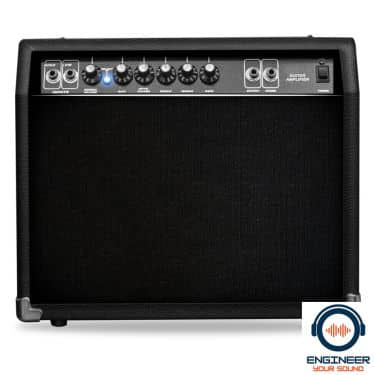As an avid guitar player, I’ve had my fair share of run-ins with that irritating, persistent nuisance that we all know as amplifier buzz. This pesky issue can turn a sweet melody into a cacophonous mess, leaving many of us scratching our heads and wondering, “What on earth is causing that?”
The main causes of guitar amp buzzing include dirty power, electrical current issues, pickups picking up interference, poorly shielded cables, ground loops, damaged cables, and poor electrical grounding.
In this article, I aim to shed some light on the causes of amplifier buzz and, more importantly, how to banish it. Drawing from my personal experiences, I will also touch on whether it’s normal for an amp to make noise and, if so, when you might need to be concerned.

What Causes My Guitar Amp To Buzz?
One of the culprits of guitar amp buzz is ‘dirty power.’ This refers to the quality of the electricity coming from your power outlets. In many homes, the power supply is not always ‘clean’, meaning other frequencies and signals can run through the same lines, causing interference.
Another common cause is electrical current issues within the amp itself. This could stem from faulty capacitors or resistors that have lost their resistance capacity.
Poorly shielded or damaged cables can also lead to amp buzz. When the shielding is compromised, the line can pick up radio frequencies or other electronic interferences.
An equally common cause is ground loops, which occur when there are two or more paths to ground from a device.
Lastly, the issue could simply be due to poor electrical grounding in your setup. In my experience, these issues can potentially create that undesirable amp buzz.
How Do I Get Rid Of Amp Buzz?
Eliminating amp buzz requires a systematic approach, starting with identifying the source of the problem. Here are some steps that I’ve found useful in my own experiences:
- Check your power source: The first step is to ensure your power supply is clean. If you suspect dirty power, you may want to invest in a power conditioner that can filter out any interference.
- Inspect your cables: Make sure your cables are in good condition and properly shielded. If you find any signs of damage or fraying, replace them immediately.
- Look for ground loops: You may have a ground loop if your setup involves multiple devices with different ground paths. Consider using a ground lift plug or a DI box with a ground lift switch in such cases.
- Check your guitar’s electronics: Listen for buzzing noises when not playing the guitar. If you still hear buzzing, the issue could be with the guitar’s electronics.
- Ensure proper electrical grounding: Make sure all your gear is properly grounded. If necessary, you might need an electrician to check the grounding in your home.
How Do I Stop My Electric Guitar From Buzzing?
Stopping your electric guitar from buzzing involves addressing several potential issues:
- Adjust the action: Lower action—a guitar’s string height—can sometimes cause the strings to vibrate against the frets, creating a buzzing sound. You may need to adjust the action to a higher setting.
- Check the frets: Uneven frets can cause buzzing. You can diagnose this by playing each fret on every string to identify if there’s a particular area causing the issue. If you find uneven frets, you might need to take your guitar to a professional for a fret levelling job.
- Inspect the guitar’s nut: The slots in the guitar’s nut may be worn down or too wide, causing the strings to buzz. Replacing or adjusting the nut can often solve this problem.
- Look at the truss rod: If your guitar’s neck is too straight or too bowed, this can cause buzzing. You might need to adjust the truss rod, which controls the neck’s curvature.
- Check for loose hardware: Loose screws or hardware can rattle when you play certain notes, causing a buzzing sound. Make sure everything is tight and secure.
- Try different strings: Sometimes, the strings themselves can cause buzzing. Trying a different gauge or brand of strings might alleviate the problem.
Remember, it might take some trial and error to figure out what’s causing the buzz, but you can usually find a solution with patience. However, it’s always worth consulting with a professional if you can’t pinpoint the problem or the adjustments seem too complex.
Remember that a little buzz is normal and might be part of your desired sound. The goal is to alleviate excessive or disruptive buzz that interferes with your playing.
Here is a fantastic video from YouTube showing 10 Ways To Reduce Your Guitar Amps Noise, Buzz or Hum.
Why Does My Guitar Amp Buzz When I Don’t Touch The Strings?
A guitar amp might buzz when you’re not touching the strings due to a phenomenon known as ‘ground noise.’ This form of electrical noise can occur if you’re not touching the strings to ground the circuit. When you release the strings, the electrical circuit within the guitar becomes incomplete, and the amplifier starts to pick up ambient electrical noise from the environment.
Now, the buzz you hear when you’re not touching the strings does not necessarily mean there’s something wrong with your amp or guitar. It’s a common occurrence in electric guitar setups.
However, if the buzz is excessively loud or only occurs with a specific guitar or cable, it may indicate a problem that needs addressing.
Is It Normal For An Amp To Make Noise?
Yes, it is normal for an amplifier to make some noise. This is especially true when the amp is turned up to higher volumes or gain settings, as these increase the amp’s sensitivity and make it more prone to picking up ambient electrical noise. However, the noise should not be excessively loud or disruptive.
If you’re hearing a constant loud buzzing, humming, or hissing, especially when the volume or gain is set to a reasonable level, it might indicate a problem. It could be due to various factors, such as ‘dirty power’, ground loops, faulty cables, bad grounding or issues within the amp or guitar itself. Therefore, while some noise is normal, persistent or excessive noise warrants investigation and possible intervention.
How Do I Fix My Audio Buzz For Any Speaker?
Fixing audio buzz in any speaker requires a systematic approach to identifying and addressing the source of the problem. Here’s how I would go about it:
- Check the audio cables and connections: Ensure all cables are plugged in correctly and securely. Faulty or poorly connected cables can often cause buzzing sounds. Look for any signs of wear or damage and replace any suspect cables.
- Inspect the power source: Poor power supplies can also cause buzzing sounds. Try plugging the speaker into a different power socket and see if the buzzing persists. Using a surge protector or power conditioner can help eliminate any electrical noise coming from the power source.
- Test different audio sources: Try using a different device to play audio. If the buzzing stops, the problem might be with the original audio source rather than the speaker.
- Update or reinstall the sound driver (for computer speakers): Sometimes, outdated or corrupted sound drivers can cause audio problems. Make sure your sound drivers are up-to-date. If you’re still experiencing issues, you may want to reinstall the drivers.
- Try a different speaker: If all else fails, try a different speaker. If the new speaker does not produce a buzzing sound, the problem is likely with the original speaker.
Remember, some level of noise might be normal, especially with older speakers or at high volumes. However, if the buzz is loud or disruptive, it’s always a good idea to try and identify the source of the problem. If you’re unable to troubleshoot the issue yourself, it might be time to consult a professional or consider replacing your speakers.
Final Conclusion
A certain level of noise or ‘buzz’ is a common occurrence in electric guitars and amplifiers. Various factors, such as ground noise, ‘dirty power’, or issues with the guitar setup itself, can contribute to this.
Some quick troubleshooting steps, like checking your cables, adjusting your guitar’s action or truss rod, or even changing the strings, can help identify and solve the issue.
Remember that while some noise is normal and might even contribute to your unique sound, excessive or disruptive noise might indicate a problem that warrants further investigation or professional intervention.
Ultimately, the goal is to ensure that your equipment functions optimally, allowing you to focus on what matters most – making great music!
